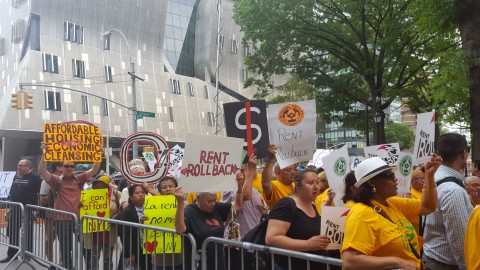On June 13, 2016, the New York City Rent Guidelines Board held a hearing of public testimony at Founders Hall of Saint Francis College in Brooklyn. This was one of five hearings scheduled before the Board passed its June 27 vote for another rent freeze on one-year leases and only a 2% increase on two-year leases for rent stabilized tenants. At the hearing, tenants and building owners were given the chance to speak to the NYC Rent Guidelines Board, which is made up of public officials, on “proposed rent adjustments for renewal leases for apartments, lofts, hotels, and other housing units subject to the Rent Stabilization Law of 1969 and the Emergency Tenant Protection Act of 1974.”[1] Each speaker had two minutes to make her or his case to the Board, while occasionally Board members themselves would ask questions of the speakers in return.
I noticed a number of noteworthy and compelling dynamics as one testimonial followed another. For example, of the six or so building owners who testified, the majority appeared White and male. In contrast, all of the five or so tenants who testified appeared to be people of color. Additionally, the large majority of the Rent Guidelines Board appeared to be White. I found these racial dynamics to be informative to the conversation and its implications, since it speaks to the wealth disparity between White folks and people of color, and the senses of injustice felt by communities of color in New York City, in this case regarding affordable and well-maintained housing. Because those in attendance at this event were not randomly selected, it is important to note that there is no guarantee that they are a representative sample of all building owners and tenants. However, the dynamics among those present certainly does offer a glimpse into the racial dynamics that shape land use in the city, and certainly reflects racial economic disparities in this country.
To begin with the building owners, there seemed to be a variety of perspectives and financial situations among the owners present. Many made claims that they were not able to cover the costs of maintaining their buildings due to rent decreases. Several of these owners maintained that there did not seem to be a point in spending time and energy in the upkeep and management of a building from which they were not profiting.
In contrast to these claims, however, one tenant asserted that an “increase in rent only benefits the owners of buildings” who do not make the proper repairs regardless of the rent amounts they receive. The tenant had a particularly unusual housing situation (at least in the context of the other testimonials at this particular hearing), explaining that his landlord was verbally abusing and intimidating him and his family, and failing to act on the presence of lead in the building, which had the potential to harm his children. He additionally claimed that the “building was dirty” and there were “bad floors,” essentially calling for more responsible and less abusive building management. At the end of his testimony, he also stated that he had a disability, and that this made his situation even more difficult. The Board was hardly empathetic to his situation, yet did point him to New York City’s Disability Rent Increase Exemption (DRIE) Program, which exempts against future rent increases for “eligible disabled persons” living in rent-controlled and rent-stabilized apartments.
Other tenants more explicitly called for a rent rollback, one proclaiming that “people are being displaced” by the escalated cost of renting in New York City and the lack of new affordable housing. As this tenant continued her testimony, a protest occurring directly outside of Founders Hall became audible to those of us in the hearing. People seemed to be chanting “Rent rollback…now!” and “Shut it down!” These protestors were members of Flatbush Tenant Coalition, a group of tenant associations in Flatbush, Brooklyn working to build power in the tenant community in the surrounding areas.[2]
The rent rollback that both the tenant and the protestors called for refers in part to some building owners tendency to overcharge tenants due to the lack of state-level enforcement of a program which states that building owners who benefit from the taxpayer subsidy must abide by the modest annual rent increases determined by the city’s public officials. Due to this poor enforcement, a number of tenants were not able to access, or did not know of their benefits under this program.[3] Thus, the tenants want justice.
A following speaker, a blunt, outspoken tenant advocated again for this justice, and received passionate praise from the audience. She boldly began with the assertion that she was “being discriminated against” and “If [she is] back to 1950, [she] wants to know.” This tenant also outright opposed landlords denying housing to Section 8 housing recipients, and therefore also castigated them for their repudiation of “the public.” As the audience cheered on this speaker, she continued to express her concerns and claimed racism from the Board. After one Board member interrupted her in what seemed an attempt either to wrap up her testimony or temporarily speak to her concerns, she exclaimed,“I don’t want them to pacify me, I want them to do something.”
By and large, it was clear that the majority of those in attendance were in favor of a rent rollback, as was evident when the audience broke into a “rent rollback” chant after the tenth speaker. It also became clear that the majority of the building owners in attendance were calling for a rent increase, yet did not seem to represent the wealthy building owners to which many of the tenants referred in disdain. I am sure that the tenants would have appreciated the presence of these building owners, but recognize that their wealth may determine their priorities in more ways than one.
[1] http://www.nycrgb.org/downloads/about/Agenda-2016-06-13.pdf
[2] https://flatbushtenantcoalition.wordpress.com/about/
[3] https://www.propublica.org/article/new-york-isnt-telling-tenants-they-may-be-protected-from-big-rent-hikes

